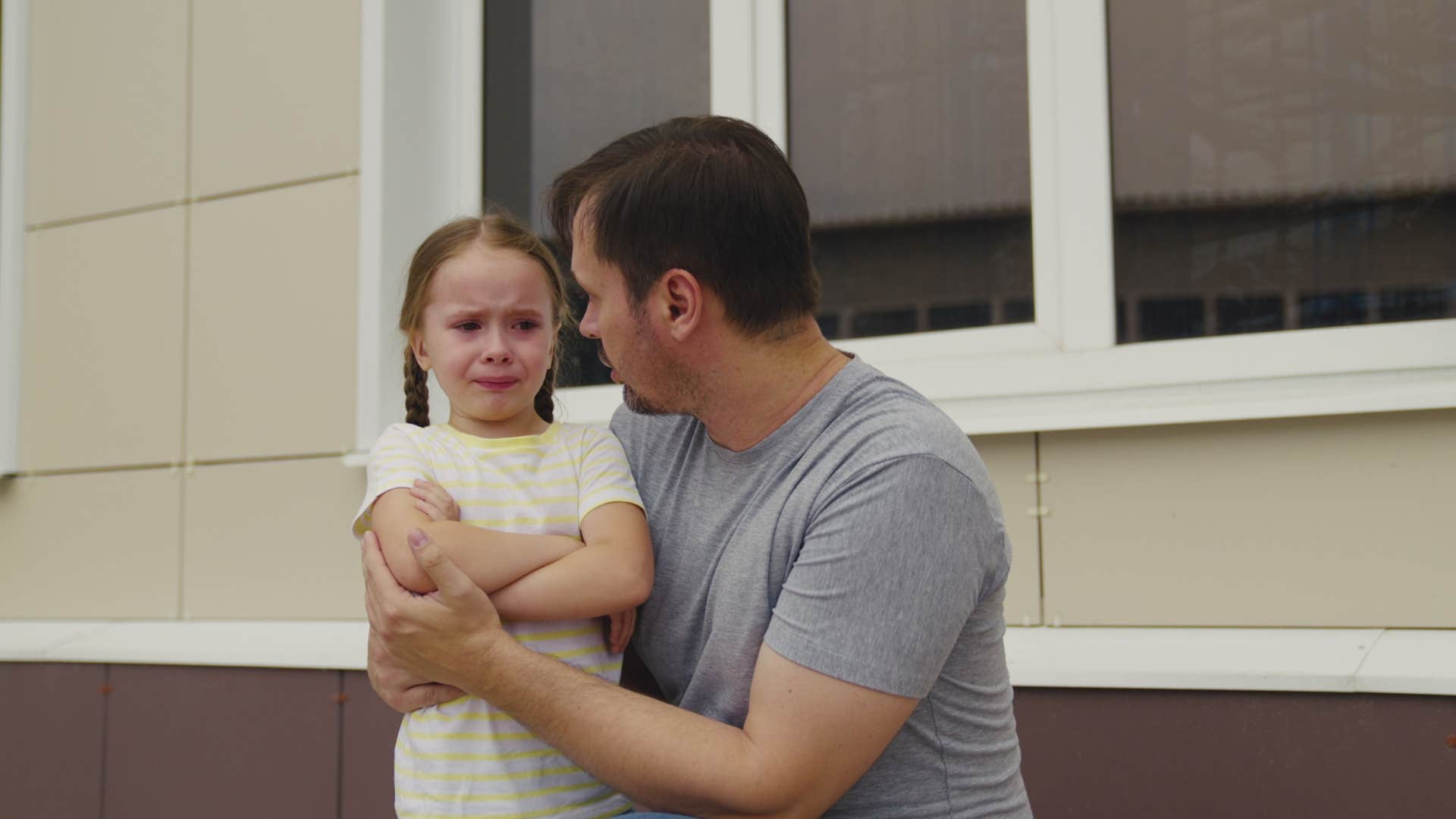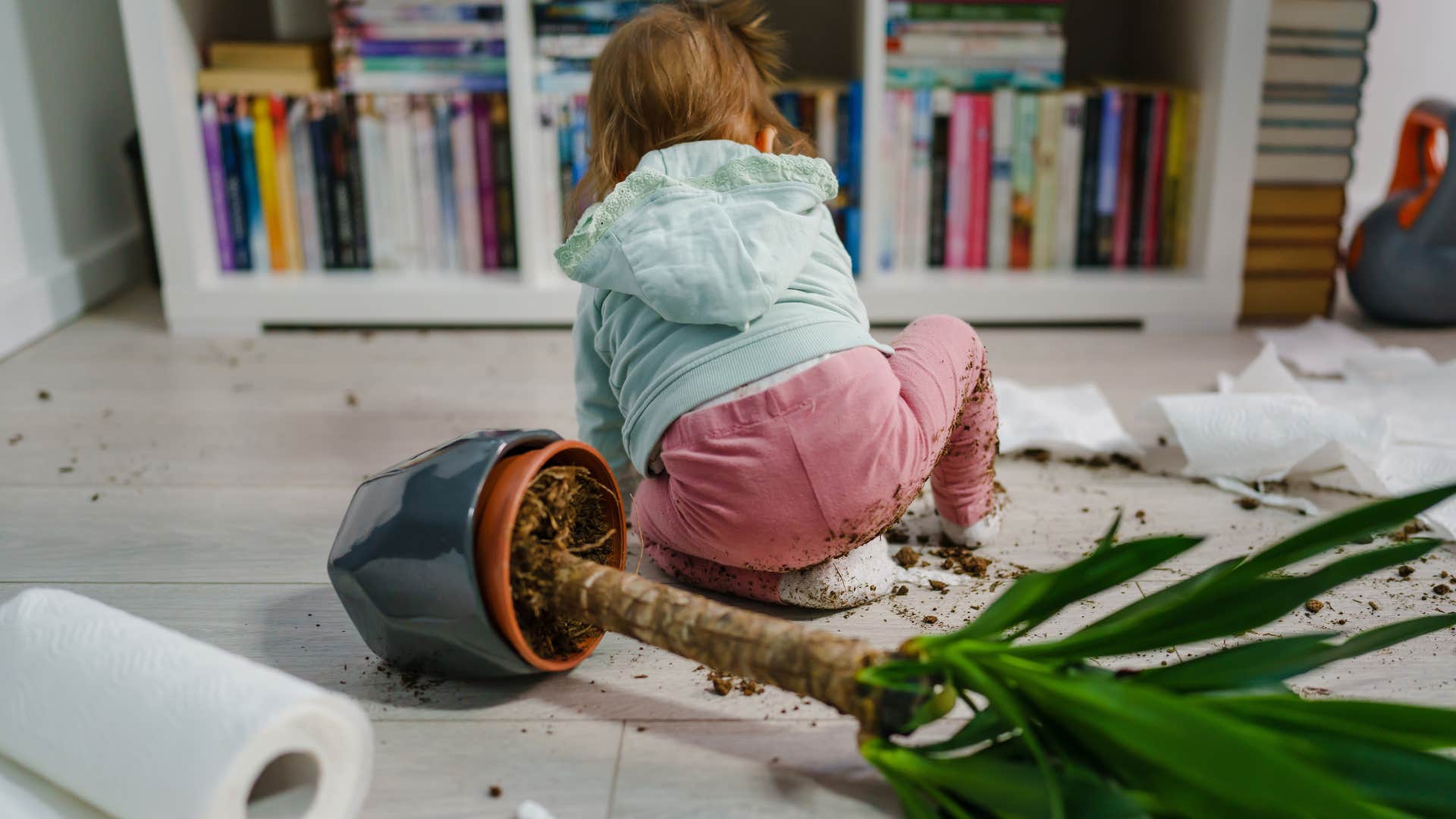11 Things Entitled Kids Do That Their Parents Think Are Adorable But Everyone Else Hates
Not everything entitled kids do is cute.
 Soloviova Liudmyla / Shutterstock
Soloviova Liudmyla / Shutterstock Every parent thinks their child is adorable, but there's a fine line between a cute moment and enabling entitled behaviors in them. While some parents laugh at their child's sassy behavior, others are quick to shut it down because these behaviors can turn into bad habits. Whether it's making a mess and not cleaning up or interrupting others when they are speaking, it is up to the parents to teach their children how to behave.
Parents are notorious for enabling bad behavior in their children. Rewarding a child after they throw a tantrum teaches them that they can do this to anyone at any time for any reason. They may even grow up to be just as entitled as they were when they were little if parents don't straighten them out.
Here are 11 things entitled kids do that their parents think are adorable but everyone else hates
1. Interrupting adult conversations
 Valery Zotev | Shutterstock
Valery Zotev | Shutterstock
Parents might think that their children interrupting other adults during a conversation is funny or cute, but it can have some serious consequences. For instance, if you are trying to network at a workplace party, having a child interrupting as you are trying to speak to your higher-ups can cause more harm than good. To solve this, a parent's approach can differ depending on how they discipline their children.
Children whose parents have more supportive reactions to their negative emotions have better emotional regulation and fewer behavioral problems. As the tears roll down their faces, calmly explaining to them that interrupting others when they are speaking is disrespectful is one of the best ways to teach them this basic social skill. Whether or not they take that lesson into consideration tells you everything you need to know about where your level of parenting is at.
2. Throwing tantrums in public and getting rewarded
 Halfpoint | Shutterstock
Halfpoint | Shutterstock
Children are often smarter than we give them credit for, especially when it comes to throwing tantrums in public. They know that other people are watching them and that you hate the extra attention that it brings you. This is why they time perfectly when you deny them something that they want. The issue is that some parents give in to their child's demands to keep them quiet, to avoid any further attention from onlookers.
These parents are not teaching their child fundamental behaviors that will help them, but are instead enabling them to become entitled. The more frequent the tantrums then there is a higher risk of emotional and behavioral problems later on in childhood. These tiny tyrants later become bullies when they get older, demanding everything without having to work for it.
3. Refusing to share
 Nicoleta Ionescu | Shutterstock
Nicoleta Ionescu | Shutterstock
Not every parent will agree on whether or not their child should share toys or food with other children. While some parents believe that this will teach their child about humility and kindness, others believe that it teaches them to have weak boundaries with others. Some might argue that their children shouldn't have to share toys that belong to them. However, this can ruin their perception of the world.
They might grow up to look out for themselves at the cost of long-lasting friendships and people to rely on. Always looking out for yourself isn't a bad thing, but you have to be prepared for the outcome that you are gambling with. An entitled child becomes an entitled adult who refuses to share anything and goes out of their way to take things from others, even if it doesn't belong to them.
4. Talking back or being sassy
 fizkes | Shutterstock
fizkes | Shutterstock
A child who is talking back to their parents can be unruly to deal with, especially when the parent is trying to get them to do something. Turning their backs when you are trying to speak to them or crossing their arms are just some of the physical behaviors that children exhibit. Some children will even make sassy comments towards their parents to try and ease the blow of the punishment, hoping that it might lighten them up.
The difference between a child who is giving you sass versus a child who is entitled is that sass is often an opinion, while entitlement is a demand. Parents must set clear rules on how they expect their children to behave, not just outside the household but also inside. If parents let this behavior slide, it can turn their already entitled child into an entitled adult who will say whatever they want to whomever they want.
5. Demanding special treatment
 YAKOBCHUK VIACHESLAV | Shutterstock
YAKOBCHUK VIACHESLAV | Shutterstock
There comes a time in any parent's life when they have to accept that their child is not growing out of certain behaviors. As entitled toddlers grow into entitled children, they begin to demand special treatment that is different from that of their siblings or peers. Accepting that this is just a natural part of their personality now will save you years of unfulfilled expectations.
While you may feel guilty for raising them to behave this way, remember that you tried your best and sometimes your best isn't good enough. Children eventually make their own decisions, the older they get, and if they choose to go down a meaner, more entitled path, then there is only so much a parent can do. Some parents have tried every disciplinary approach and read every book for assistance, but it was never enough.
6. Making a mess and not cleaning up
 Miljan Zivkovic | Shutterstock
Miljan Zivkovic | Shutterstock
Being a caretaker to a child is one of the messiest jobs on the planet. One minute your toddler is doing just fine, and then the next minute they've knocked down your friend's flower pot, causing dirt to fly everywhere. Some adults expect children to clean as if they have years of experience doing it. It takes time and guidance for them to be able to do it effectively on their own.
More neurotic parents might say that a messy home can traumatize your children, and while it may be true for homes that look like a storage unit, not all homes are that bad. Parents often struggle the most with teaching their teenagers how to do it properly. Some children don't understand expectations or don't see cleaning as their responsibility. So, this is on the parents to instill why it's important and how they can do it successfully.
7. Not using basic manners
 Media_Photos | Shutterstock
Media_Photos | Shutterstock
Some parents refuse to teach their children basic manners, such as asking for permission instead of taking things that don't belong to them. An entitled child will take anything that doesn't belong to them simply because they want it, and couldn't care less about putting their feet right up on the table where others are eating.
As the experts at Steadfast Academy explain, "Manners aren’t just a formality – they really matter. Having good manners will teach children respect and will help others respect them. Saying thank you shows appreciation, while saying please shows thoughtfulness. Manners also display gratitude instead of entitlement, which can speak wonders about a child’s personality."
8. Expecting adults to entertain them
 fizkes | Shutterstock
fizkes | Shutterstock
Some parents can't play with their children all the time, even if it does help their development in the long run. Not only does it strengthen the bond that you have with them, but it can also help them reduce stress. However, there is a fine line between a parent having the time and simply not wanting to do it.
Let's face it, parents are busy individuals, and sometimes they can't entertain their children because something more important is preoccupying their time. It's when the child feels entitled to the parents' time, regardless of where there seems to be an issue. A child demanding that a parent entertain them just because they are bored can get a little annoying, especially if they have company over.
9. Bragging constantly
 kitty | Shutterstock
kitty | Shutterstock
Entitled children love to brag about themselves. This is because they like to feel important or want attention, especially if they feel insecure and overlooked at home. While parents might take pride in this type of behavior, other children and onlookers might not. People might think that they are being mean to others or are trying too hard to fit in, which can be both annoying and sad.
Everyone brags for different reasons, but children often do it because something is lacking at home. From my experience, the children who brag the most are often the loneliest. Being insensitive and making faces at another kid is not good sportsmanship or being a team player. It's just plain old mean.
10. Throwing fits when they lose
 fizkes | Shutterstock
fizkes | Shutterstock
It's one thing to brag about things, but it's a whole other thing to act out of character when you lose a game. When children are young, they learn about competitiveness through games played with their peers or younger siblings. An entitled child may behave violently or angrily towards the child who won the game as a form of retaliation.
When they're playing a sport, it can be rough on parents as they now have to deal with conflicts between two children who are behaving stubbornly. Kids on sports teams aren't always in competitive mode. In fact, they are the ones who often have the strongest friendships. That is usually where parents can teach their kids that it's not about winning or losing, but it's about having fun.
11. Acting like the rules don't apply them
 Pixel-Shot | Shutterstock
Pixel-Shot | Shutterstock
Simply saying the word 'no' can do wonders for parents who want to raise children with kindness and compassion. For instance, a child demanding that his parents pick him up from school is an entitled child. Entitled children act like the rules don't apply to them, and if that sounds familiar, it's because there are many adults in this world who behave that way as well. Parents who encourage this behavior will deal with a lot more than they've bargained for when the child is older and showcasing all the signs of an entitled adult.
As children, these things might seem adorable, but most adults who do things aren't. They are deeply troubled individuals who are selfish and lack empathy towards others. The only way to prevent your child from falling down this path is to teach them not to be this way. You'll be glad you did later on.
Sylvia Ojeda is a screenplay writer and journalist who covers self-help, relationships, culture, and human interest stories.

